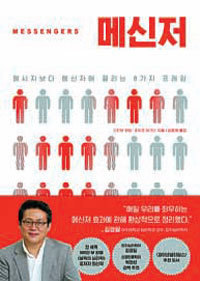Destiny of messages depends on messenger
Destiny of messages depends on messenger
Posted October. 09, 2021 07:16,
Updated October. 09, 2021 07:16

We live in an era flooded with messages. It is hard to distinguish between fake news and real news. At times like this, there is something more important than messages. It is the messenger. The book “Messengers: Who We Listen To, Who We Don't, and Why” emphasizes that the messenger, not the message, needs more focus. Behavioral scientists Stephen Martin and Joseph Marks co-authored the book.
People believe that they make rational judgments based on objective information or messages. According to research results of many disciplines, however, it is not true. For example, people tend to be drawn to what a non-expert who is well-known and has a high social status says, rather than what an expert of a field concerned says. Think of an experience picking up a product without any verification after listening to a celebrity talking about how great the product is. Many judgments are dependent on the messenger, which is why judgments about the messenger are critical.
The authors categorize messenger into eight frames – hard messengers (socioeconomic status, competence, dominance, and attractiveness) and soft messengers (warmth, vulnerability, trust, and charisma). Hard messengers have a big influence in organizations or among colleagues based on their sense of relative superiority. Meanwhile, soft messengers move people by forming a bond.
The authors explain the influence of each frame in an easy-to-understand manner by providing everyday situations and various experiments as examples. The book can help both people who want to become strong messengers and those who don’t want to be swayed by messengers.
Gab-Sik Kim dunanworld@donga.com
Headline News
- Joint investigation headquarters asks Yoon to appear at the investigation office
- KDIC colonel: Cable ties and hoods to control NEC staff were prepared
- Results of real estate development diverged by accessibility to Gangnam
- New budget proposal reflecting Trump’s demand rejected
- Son Heung-min scores winning corner kick







